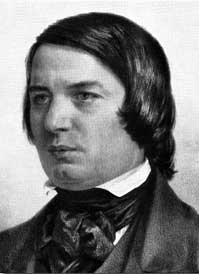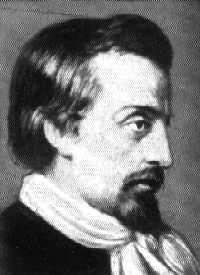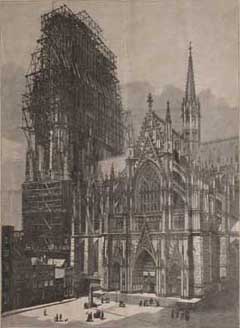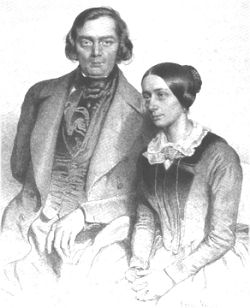3. Die Rose, die Lilie, die Taube, die Sonne
Die Rose, die Lilie, die Taube, die Sonne,
Die liebt' ich einst alle in Liebeswonne.
Ich lieb' sie nicht mehr, ich liebe alleine
Die Kleine, die Feine, die Reine, die Eine;
Sie selber, aller Liebe [Wonne],
Ist Rose und Lilie und Taube und Sonne.
[Ich liebe alleine
Die Kleine, die Feine, die Reine, die Eine.]
4. Wenn ich in deine Augen seh'
Wenn ich in deine Augen seh',
So schwindet all' mein Leid und Weh;
Doch wenn ich küße deinen Mund,
So werd' ich ganz und gar gesund.
Wenn ich mich lehn' an deine Brust,
Kommt's über mich wie Himmelslust;
Doch wenn du sprichst: ich liebe dich!
So muß ich weinen bitterlich.
5. Ich will meine Seele tauchen
Ich will meine Seele tauchen
In den Kelch der Lilie hinein;
Die Lilie soll klingend hauchen
Ein Lied von der Liebsten mein.
Das Lied soll schauern und beben
Wie der Kuß von ihrem Mund,
Den sie mir einst gegeben
In wunderbar süßer Stund'.
6. Im Rhein, im schönen Strome
Im Rhein, im schönen Strome,
Da spiegelt sich in den Well'n
Mit seinem großen Dome
Das große, heil'ge Köln.
Im Dom da steht ein Bildnis,
Auf goldnem Leder gemalt;
In meines Lebens Wildnis
Hat's freundlich hineingestrahlt.
Es schweben Blumen und Eng'lein
Um unsre liebe Frau;
Die Augen, die Lippen, die Wänglein,
Die gleichen der Liebsten genau.
7. Ich grolle nicht, und wenn das Herz auch bricht
Ich grolle nicht, und wenn das Herz auch bricht,
Ewig verlor'nes Lieb ! Ich grolle nicht.
Wie du auch strahlst in Diamantenpracht,
Es fällt kein Strahl in deines Herzens Nacht.
Das weiß ich längst.
Ich grolle nicht, und wenn das Herz auch bricht,
Ich sah dich ja im Traume,
Und sah die Nacht in deines Herzens Raume,
Und sah die Schlang', die dir am Herzen frißt,
Ich sah, mein Lieb, wie sehr du elend bist.
Ich grolle nicht.
8. Und wüßten's die Blumen, die kleinen
Und wüßten's die Blumen, die kleinen,
Wie tief verwundet mein Herz,
Sie würden mit mir weinen,
Zu heilen meinen Schmerz.
Und wüßten's die Nachtigallen,
Wie ich so traurig und krank,
Sie ließen fröhlich erschallen
Erquickenden Gesang.
Und wüßten sie mein Wehe,
Die goldnen Sternelein,
Sie kämen aus ihrer Höhe,
Und sprächen Trost mir ein.
Sie alle können's nicht wissen,
Nur eine kennt meinen Schmerz;
Sie hat ja selbst zerrissen,
Zerrissen mir das Herz.
9. Das ist ein Flöten und Geigen
Das ist ein Flöten und Geigen,
Trompeten schmettern darein;
Da tanzt [wohl] den Hochzeitreigen
Die Herzallerliebste mein.
Das ist ein Klingen und Dröhnen,
Ein Pauken und ein Schalmei'n;
Dazwischen schluchzen und stöhnen
Die lieblichen Engelein.
10. Hör' ich das Liedchen klingen
Hör' ich das Liedchen klingen,
Das einst die Liebste sang,
So will mir die Brust zerspringen
Von wildem Schmerzendrang.
Es treibt mich ein dunkles Sehnen
Hinauf zur Waldeshöh',
Dort löst sich auf in Tränen
Mein übergroßes Weh'.
11. Ein Jüngling liebt ein Mädchen
Ein Jüngling liebt ein Mädchen,
Die hat einen andern erwählt;
Der andre liebt eine andre,
Und hat sich mit dieser vermählt.
Das Mädchen nimmt aus Ärger
Den ersten besten Mann,
Der ihr in den Weg gelaufen;
Der Jüngling ist übel dran.
Es ist eine alte Geschichte,
Doch bleibt sie immer neu;
Und wem sie just passieret,
Dem bricht das Herz entzwei.
12. Am leuchtenden Sommermorgen
Am leuchtenden Sommermorgen
Geh' ich im Garten herum.
Es flüstern und sprechen die Blumen,
Ich aber, ich wandle stumm.
Es flüstern und sprechen die Blumen,
Und schaun mitleidig mich an:
Sei unserer Schwester nicht böse,
Du trauriger blasser Mann.
13. Ich hab' im Traum geweinet
Ich hab' im Traum geweinet,
Mir träumte, du lägest im Grab.
Ich wachte auf, und die Träne
Floß noch von der Wange herab.
Ich hab' im Traum geweinet,
Mir träumt', du verließest mich.
Ich wachte auf, und ich weinte
Noch lange bitterlich.
Ich hab' im Traum geweinet,
Mir träumte, du bliebest mir gut.
Ich wachte auf, und noch immer
Strömt meine Tränenflut.
14. Allnächtlich im Traume seh' ich dich
Allnächtlich im Traume seh' ich dich
Und sehe dich freundlich grüßen,
Und laut aufweinend stürz' ich mich
Zu deinen süßen Füßen.
Du siehst mich an wehmütiglich
Und schüttelst das blonde Köpfchen;
Aus deinen Augen schleichen sich
Die Perlentränentröpfchen.
Du sagst mir heimlich ein leises Wort
Und gibst mir den Strauß von Zypressen.
Ich wache auf, und der Strauß ist fort,
Und das Wort hab' ich vergessen.
15. Aus alten Märchen winkt es
Aus alten Märchen winkt es
Hervor mit weißer Hand,
Da singt es und da klingt es
Von einem Zauberland;
Wo bunte Blumen blühen
Im gold'nen Abendlicht,
Und lieblich duftend glühen,
Mit bräutlichem Gesicht;
Und grüne Bäume singen
Uralte Melodei'n,
Die Lüfte heimlich klingen,
Und Vögel schmettern drein;
Und Nebelbilder steigen
Wohl aus der Erd' hervor,
Und tanzen luft'gen Reigen
Im wunderlichen Chor;
Und blaue Funken brennen
An jedem Blatt und Reis,
Und rote Lichter rennen
Im irren, wirren Kreis;
Und laute Quellen brechen
Aus wildem Marmorstein.
Und seltsam in den Bächen
Strahlt fort der Widerschein.
Ach, könnt' ich dorthin kommen,
Und dort mein Herz erfreu'n,
Und aller Qual entnommen,
Und frei und selig sein!
Ach! jenes Land der Wonne,
Das seh' ich oft im Traum,
Doch kommt die Morgensonne,
Zerfließt's wie eitel Schaum.
16. Die alten, bösen Lieder
Die alten, bösen Lieder,
Die Träume bös' und arg,
Die laßt uns jetzt begraben,
Holt einen großen Sarg.
Hinein leg' ich gar manches,
Doch sag' ich noch nicht, was;
Der Sarg muß sein noch größer,
Wie's Heidelberger Faß.
Und holt eine Totenbahre,
Und Bretter fest und dick;
Auch muß sie sein noch länger,
Als wie zu Mainz die Brück'.
Und holt mir auch zwölf Riesen,
Die müssen noch stärker sein
Als wie der starke Christoph
Im Dom zu Köln am Rhein.
Die sollen den Sarg forttragen,
Und senken ins Meer hinab;
Denn solchem großen Sarge
Gebührt ein großes Grab.
Wißt ihr, warum der Sarg wohl
So groß und schwer mag sein?
Ich senkt' auch meine Liebe
Und meinen Schmerz hinein.
Text by: Heinrich Heine (1797-1856)
|
3. The rose, the lily, the dove, the sun
The rose, the lily, the dove, the sun,
I loved them all once in love's bliss.
I love them no more, I love only
The Small, the Fine, the Pure the One;
She herself--the source of all love--
IS the rose, lily, dove, and sun
I love only that which is small,
Fine, pure--the one, the ONE!
4. When I gaze into your eyes
When I gaze into your eyes,
All my pain and woe vanishes;
Yet when I kiss your lips,
I am made wholly and entirely healthy.
When I lay against your breast
It comes over me like longing for heaven;
Yet when you say, "I love you!"
I must cry so bitterly.
5. I want to delve my soul
I want to delve my soul
Into the cup of the lily;
The lily should give resoundingly
A song belonging to my beloved.
The song should shudder and tremble
Like the kiss from her lips
That she once gave me
In a wonderfully sweet hour.
6. In the Rhine, in the fair stream
In the Rhine, in the holy stream
Is it mirrored in the waves -
With its great cathedral -
That great, holy city Cologne.
In the Cathedral stands an image
Painted on golden leather;
Into the wildness of my life
Has it shone, friendly.
Flowers and little cherubs hover
Around our beloved Lady;
The eyes, the lips, the cheeks--
They match my beloved's exactly.
7. I bear no grudge, even when my heart is breaking
I bear no grudge, even when my heart is breaking!
Love lost forever! I bear no grudge.
Although you shine in diamond splendor,
No beam falls into the night of your heart.
I will know that for a long time.
I bear no grudge, and when my heart is breaking!
I truly saw you in my dreams
And saw the night in the room of your heart,
And saw the snake that bites your heart;
I saw, my dear, how truly miserable you are.
I bear no grudge.
8. And if the blooms - the small ones - knew
And if the blooms - the small ones - knew
How deeply wounded is my heart,
They would weep with me
To heal my pain.
And if the nightingales knew
How sad and ill I am,
They would let forth merrily
A refreshing song.
And if they knew my woe -
The little golden stars -
They would come down from their heights
And speak their consolation to me.
But all of them could not know this,
Only one knows my pain;
She herself has indeed torn,
Torn my heart in two.
9. There is a fluting and fiddling
There is a fluting and fiddling
With trumpets blaring in;
In a wedding dance dances
She who is my heart's whole love.
There is a ringing and roaring,
A drumming and sounding of shawms
In between which sob and moan
The lovely little angels.
10. I hear the dear song sounding
I hear the dear song sounding
That once my beloved sang.
And my heart wants to burst so strongly
From the savage pressure of pain.
A dark longing is driving me
Up into the heights of the woods
Where in my tears can be dissolved
My own colossal woe.
11. A young man loved a girl
A young man loved a girl
Who had chosen another man;
This other man loved yet another girl
And wed that one.
The first girl married out of spite
The first, best man
That happened into her path;
That young man is not well off.
It is an old story,
Yet it remains ever new;
And to he whom it has just happened,
It will break his heart in two.
12. On a shining summer morning
On a shining summer morning
I wander around my garden.
The flowers are whispering and speaking;
I, however, wander silently.
The flowers are whispering and speaking
And look at me sympathetically.
"Do not be angry with our sister,
You sad, pale man."
13. I wept in my dream
I wept in my dream -
I dreamed you lay in a grave.
I awoke, and my tears
Still flowed down my cheeks.
I wept in my dream -
I dreamed you had abandoned me.
I awoke and I cried
Bitterly for a long while.
I wept in my dream -
I dreamed you were still good to me.
I awoke, and still
Streams my flood of tears.
14. Nightly I see you in my dreaming
Nightly I see you in my dreams
And I see you greet me, friendly,
And crying out loudly, I throw myself
At your sweet feet.
You look at me sorrowfully
And shake your dear, blond head;
From your eyes sneak forth
The pearly teardrops.
You say a soft word to me secretly,
And give me a branch of the cypress;
I awake, and the branch is gone,
And I have forgotten the word.
15. From old fairy tales beckons
From old fairy tales beckons
To me a white hand,
Where there is a singing and sounding
Of a magical land,
Where multicolored flowers bloom
In golden twilight,
And glow lovely and fragrant
With their bridal visage,
And where green trees sing
Primeval melodies;
Where breezes sound secretly,
And birds warble,
And mist-figures rise
From the earth
And dance airy round-dances
In an odd chorus,
And blue sparks burn
On every leaf and twig,
And red lights run
In a mad, chaotic circle,
And loud springs break
Out of wild marble stone,
And in the streams--oddly--
Shine forth the reflections.
Ah! If I could enter there
And indulge my heart
And give up my agony
And be free and holy!
Ah! This is the land of bliss
That I see so often in a dream,
But when the morning sun comes,
It melts like mere froth.
16. The old, angry songs
The old, angry songs,
The dreams angry and wicked--
Let us now bury them.
Fetch a large coffin.
In it will I lay many things,
But I will still not say quite what.
The coffin must be still larger
As the cask in Heidelberg.
And fetch a death bier
And planks firm and thick;
They must be still longer
Than the bridge to Mainz.
And fetch me, too, twelve giants;
They must be still stronger
Than that strong St. Christopher
In the Cathedral to Cologne on the Rhine.
They should carry the coffin away
And sink it down deep in the sea,
Since such a great coffin
Deserves a great grave.
Do you know why the coffin
Must be so large and heavy?
I sank with it my love
And my pain, deep within.
Translation: by Paul Hindemith
|




